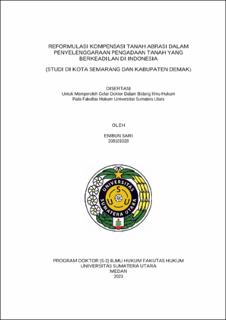| dc.contributor.advisor | Yamin, Muhammad | |
| dc.contributor.advisor | Sembiring, Rosnidar | |
| dc.contributor.advisor | Purba, Hasim | |
| dc.contributor.author | Sari, Embun | |
| dc.date.accessioned | 2024-11-12T08:22:26Z | |
| dc.date.available | 2024-11-12T08:22:26Z | |
| dc.date.issued | 2023 | |
| dc.identifier.uri | https://repositori.usu.ac.id/handle/123456789/98763 | |
| dc.description.abstract | Land acquisition for the Semarang-Demak toll road integrated with Sea Wall development began at the end of 2016 and has not been completed due to the vanished land issue due to sea water abrasion. The Basic Agrarian Law (BAL) mandates vanished land causing loss of land rights. Land acquisition law does not recognize compensation for vanished land. The absence of regulation regarding compensation for vanished land causes a sense of injustice that leads to rejection of the development. Using a normative research type of socio-legal approach, this study analyzes legal status issues and reformulation of land abrasion compensation arrangements in development for public interest. Field data was obtained from land acquisition implementers for the Semarang-Demak toll road, to sharpen the analysis interviews were conducted with representatives of affected communities and the policy makers involved. The land that is determined to be vanished due to abrasion cannot be compensated according to land acquisition law but only be given spiritual assistance. The implications of the formulation of compensation for abrasion land which is considered by the community to be inadequate and fair results in community rejection. Regulations which are prepared as a response to community rejection lead to dualism and disharmony in regulations which results in inefficiency and a halt in the process of land acquisition, toll road construction and disaster management. So that there is no dualism in compensation arrangements in land acquisition, land acquisition law reformulation that regulates the types of land conditions, robust inventory and identification procedures, and land valuation based on physical land conditions is needed to ensure fairness and legal certainty for abrasive landowners. Fair compensation is calculated based on market price with respect to estimated reconstruction or reclamation costs. To fulfill the community's sense of justice, non-physical values are also taken into account in the form of emotional losses due to lost opportunities for land reconstruction or reclamation and other assessable losses. | en_US |
| dc.language.iso | id | en_US |
| dc.publisher | Universitas Sumatera Utara | en_US |
| dc.subject | Acquisation | en_US |
| dc.subject | Land | en_US |
| dc.subject | Compensation | en_US |
| dc.subject | Abrasion | en_US |
| dc.title | Reformulasi Kompensasi Tanah Abrasi dalam Penyelenggaraan Pengadaan Tanah yang Berkeadilan di Indonesia (Studi di Kota Semarang dan Kabupaten Demak) | en_US |
| dc.title.alternative | Reformulation of Land Abrasion Compensation in the Implementation of Equitable Land Procurement in Indonesia (Study in Semarang City and Demak District) | en_US |
| dc.type | Thesis | en_US |
| dc.identifier.nim | NIM208101028 | |
| dc.identifier.nidn | NIDN0031126168 | |
| dc.identifier.nidn | NIDN0002026602 | |
| dc.identifier.nidn | NIDN0003036602 | |
| dc.identifier.kodeprodi | KODEPRODI74001#Ilmu Hukum | |
| dc.description.pages | 448 Pages | en_US |
| dc.description.type | Disertasi Doktor | en_US |
| dc.subject.sdgs | SDGs 16. Peace, Justice And Strong Institutions | en_US |


